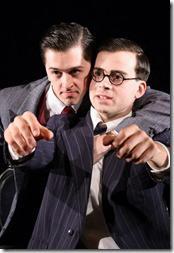
Never the Sinner
Written by John Logan
VG Theater, 2433 N. Lincoln (map)
thru Dec 6 | tix: $20-$60 | more info
Check for half-price tickets
Gary Griffin creates gripping, topical stage revival
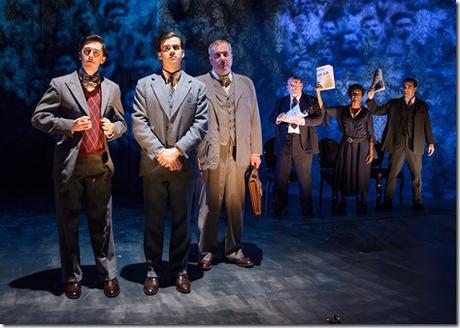
Victory Gardens Theater presents
Never the Sinner
Review by Lawrence Bommer
In 1978, long before he became a bigtime screenwriter (“Gladiator,” “Any Given Sunday,” “Vanilla Sky,” “Spectre,” “Mission Impossible II,” “The Aviator,” “The Time Machine,” “Skyfall,” Showtime’s “Penny Dreadful”), Chicago writer John Logan meticulously reconstructed 1924’s “crime of the century.” He created an absorbing account of “thrill killers” Nathan Leopold and Richard Loeb. (Logan showed the same painstaking “sympathy with the devil” in Hauptmann, a psychological/historical reconstruction of another infamous murder that put Denis O’Hare on the road to fame.)
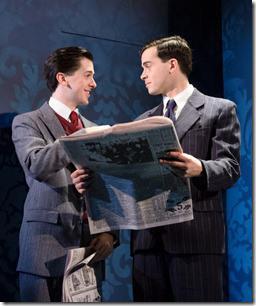
Never the Sinner has returned to the Victory Gardens Theater. In Gary Griffin’s well-tuned and topical revival (previous productions played Stormfield Theatre in 1984, Victory Gardens in 1995, and Shining Through Productions in 2002), the stone-cold killers recall Columbine as much as the University of Chicago: It feels inevitable that their fantasies of shocking a world that ignored their dangerousness had to be acted out. If Logan at times romanticizes their forbidden passion, the stretch is no greater than crusading counsel Clarence Darrow successfully asking the state not to kill them out of vengeance.
Logan alternates Cook County’s “trial of the century” (actually a sentencing hearing since they’d already pled guilty) with flashbacks detailing the twisted relationship between the seductive, amoral and sociopathic Loeb and the impressionable and desperately devoted bird fancier Leopold. Separately, only Loeb might have become a killer–but, yoked by bad ideas as much as sex, they brought out the worst of their weaknesses.
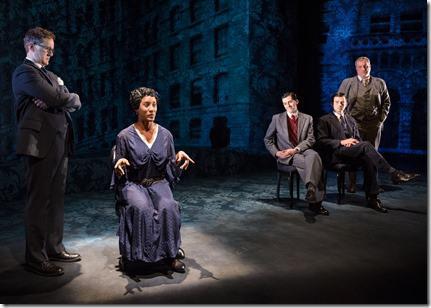
Implied throughout is the rationale for their evil–the overcompensation by two Jewish closeted homosexuals in stiflingly insular Hyde Park who imagined themselves superior to a world that saw them as sick. (Going easy on the child killers, Logan leaves out horrendous proof of the duo’s shameless opportunism: Even after killing Bobby Franks, the creatures tried to get ransom money from the crushed parents. As it turned out, they were caught as much by the unique typewriter they employed as by the special glasses that Leopold left at the crime scene.)
The actors suggest more than obvious resemblances. Japhet Balaban’s half-formed ornithologist Leopold seems a blank slate upon which Jordan Brodess’ insufferably cocky and casually sadistic Loeb can write what he wants. Only as they face separation do you sense how the preppie twosome complete each other in the worst way. Regrettably, some in the opening night audience found encouragement as they conspiratorially chuckled along with these baby-faced killers: Too often Balaban and Brodess (their names as alliterative as their originals) convey an authentic rather than a false bravado. They’re a bit too cool for their cruelty. The vulnerability of these pretend punks gets artfully concealed by their flippant insolence. It also siphons off any mounting fear they feel as a city’s collective scorn undermines their Nietzchean pretensions.
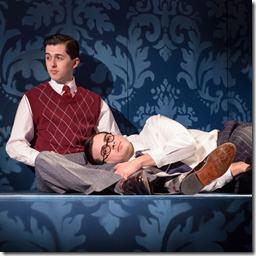
Citing their youth as an argument for the magnificence of mercy (as if the victim’s age doesn’t countermand it), Keith Kupferer’s Darrow doggedly pursues pure principle. He attacks capital punishment more than he defends these lost boys. Of course, his plea to condemn the sin but spare the sinner (to some a distinction without a difference) prevails with the sentencing judge. (To provide an epilogue that the play does not, a dozen years later Loeb was murdered in jail after coming on to a fellow inmate: As one wag put it, “His sentence was ended with a proposition.” The comparatively gentler Leopold was finally released and moved to Puerto Rico where he could be reunited with his beloved birds.)
Interestingly, Logan ends the play, not with their escape from the gallows, but with his version of the first time Leopold and Loeb meet (which was the last time they had a chance for a decent life). In one moment the crime to come is hatched by two secret-sharers: You sense the utter waste of three lives, doomed from this instant on.
Rating: ★★★
Never the Sinner continues through December 6th at Victory Gardens Biograph Theater, 2433 N. Lincoln (map), with performances Tuesdays-Fridays at 7:30pm, Saturdays 3pm and 7:30pm, Sundays 3pm. Tickets are $20-$60 (students/groups: $15), and are available by phone (773-871-3000) or online through PrintTixUSA.com (check for half-price tickets at Goldstar.com). More info at VictoryGardens.org. (Running time: 90 minutes, no intermission)
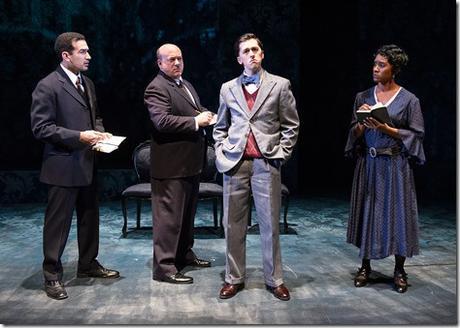
Photos by Michael Courier
artists
cast
Japhet Balaban (Leopold), Bill Bannon (Reporter 1), Jordan Brodess (Loeb), Celeste M. Cooper (Reporter 2), Derek Hasenstab (Crowe), Keith Kupferer (Darrow) and Demetrios Troy (Reporter 3)
behind the scenes
Gary Griffin (director), Kurtis Boetcher (set design), Janice Pytel (costume design), Keith Parham (lighting design), Andre Pluess (sound design), Michael Stanfill (projection design), Isaac Gomez (dramaturg), Almee Plant (props master), Lavina Jadhwani (asst. director), Tina M. Jach (productions stage manager), Michael Courier (photos)
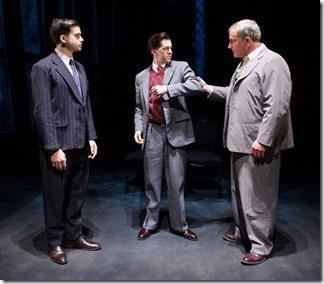
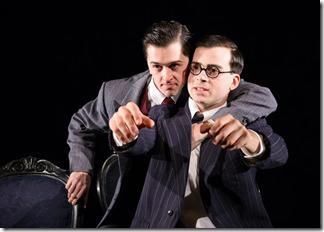
15-1129

